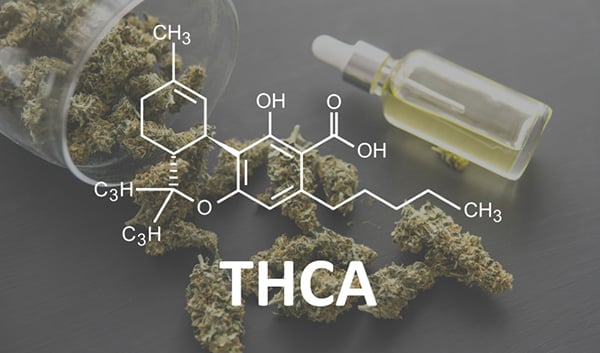Is This The End For THCA Products
Is This The End For THCA Products

Since Congress passed the Farm Improvement Act of 2018 (or the 2018 Farm Bill), people have been trying to find creative ways to sell psychoactive cannabis-derived products. One example is THCA products, such as THCA herbs, which have high levels of THCA content.
In this article, we will examine the legal status of THCA products and why the "loophole" that led to their popularity seems to be coming to an end.
The 2018 Farm Bill and an Introduction to THCA
Hemp can only contain 0.3% delta-9 tetrahydrocannabinol (THC). According to the DEA, hemp or its derivatives are cannabis if they contain more than 0.3% THC. The issue is that hemp often contains delta-9 tetrahydrocannabinolic acid (THCA). THCA is very similar to THC and, when heated, is converted to THC.
Although THCA itself is not mentioned in the federal definition of hemp or marijuana, it plays an important role in determining the legal or illegal status of a product due to conversion to THC.
The 2018 Farm Bill requires a "total THC" test for all marijuana, defined as including the actual THC content plus the THCA converted to THC. If the total THC using this method exceeds 0.3%, the hemp must be destroyed.
Interestingly, there are several ways THCA can be converted to THC, a method referred to as post-decarboxylation. The U.S. Department of Agriculture's (USDA) 2018 Farm Bill regulations define this process as follows:
In the context of testing methodologies for THC concentration levels in hemp, means a value determined after the process of decarboxylation that determines the potential total delta-9 tetrahydrocannabinol content derived from the sum of the THC and THCA content and reported on a dry weight basis. The post-decarboxylation value of THC can be calculated by using a chromatograph technique using heat, and gas chromatography, through which THCA is converted from its acid form to its neutral form, THC. Thus, this test calculates the total potential THC in a given sample. The post-decarboxylation value of THC can also be calculated by using a liquid chromatograph technique, which keeps the THCA intact. This technique requires the use of the following conversion: [Total THC = (0.877 x THCA) + THC], which calculates the potential total THC in a given sample.
In simple terms, gas chromatography heats THCA until it is converted to THC, while liquid chromatography does not convert THCA but applies the formula used to calculate total THC levels. There is quite a lively debate in the industry about which of these two approaches is better, but we will leave that discussion for another day. Now, let's see how this affects THCA products.
What supporters of THCA products claim
The 2018 Farm Bill and the U.S. Department of Agriculture require total THC testing for pre-harvest marijuana batches. They do not mandate post-harvest testing of cannabis or cannabis products. The Controlled Substances Act (CSA) prohibits marijuana but contains no specific requirements to test marijuana products as it is not regulated.
This all raises a key question: If marijuana passes pre-harvest testing (i.e., THC and THCA levels are lower than required by the 2018 Farm bill), and after the THCA levels increase to the point where if tested again, it would be over the 0.3% threshold would it still be illegal
Many people argued that as it had passed the first test, it would technically be perfectly legal, at least under federal law. This perspective is put forward very well by Rod Knight. The case he puts forward on canna-business.law speculates that THCA flower is not a controlled substance. Once the herb has been classified as having less than 0.3% THC, it remains legal even if it has a high amount of THCA.
Why THCA products could be problematic
First of all, state laws matter. Even if something is allowed at the federal level, if it is banned in a certain state, it cannot be sold there.
Many states have total THC requirements for cannabis products, which in my opinion, would explicitly ban THCA products. So even though THCA products are legal at the federal level, it's purely academic when applied in a particular state. In states where the product's total THC is a required testing element, then these products are undoubtedly illegal.
Second, it's practically difficult for law enforcement or courts unfamiliar with the nuances of federal marijuana law to claim THCA products are legal. Imagine a truck driver getting pulled over with a car full of THCA products (25% THCA content). After these products are tested, THC content will reach double digits. The driver could be in serious trouble and must do his best to convince the court that the gap in testing requirements in the 2018 Farm Bill makes the product legal. Even assuming the argument is sound, there are too many chances that law enforcement won't agree. The issue could need to be resolved by an appeals court, which would be expensive, time-consuming, and risky.
The law, at least for a while, provided a loophole that allowed THCA products to thrive in the market where other THC products were illegal.
This allowed people in states without recreational cannabis laws to still get high by exploiting this loophole and using THCA products instated of THC cannabis. However, as more states move to legalize recreational cannabis, the market space for THCA is naturally shrinking.
DEA stance on THCA products
The DEA seems to have solved that problem for now. Because under the 2018 Farm Bill, THCA must be converted to THC. In the near future, the DEA is expected to take additional regulatory actions targeting cannabinoid products. Who knows what it will look like or if THCA products will be removed from the market?
We could also see congressional action when the farm bill is renewed later this year. So until then, the jury's out, but the future for THCA products seems uncertain at best.
